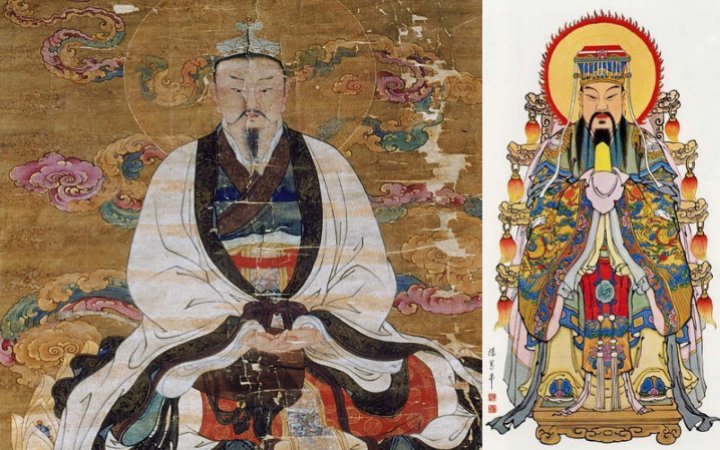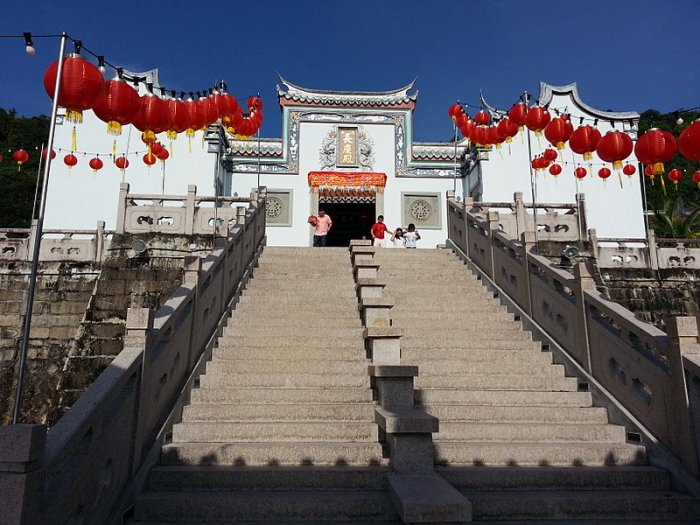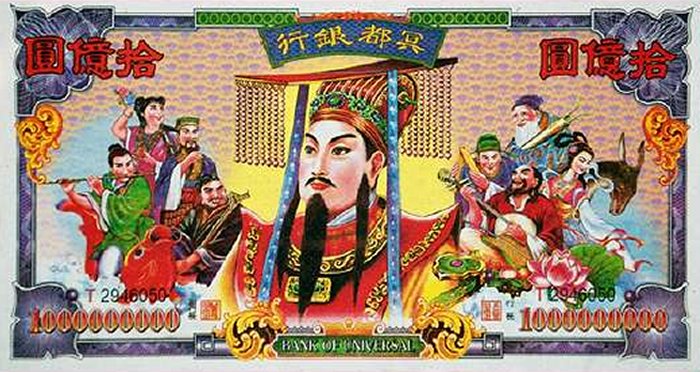Jade Emperor – Supreme Ruler Of Heaven In Chinese Mythology
Ellen Lloyd - AncientPages.com - The Jade Emperor is very important and powerful being in Chinese mythology. Known under many different names, the Jade Emperor was the ruler of Heaven and official patron deity of the Chinese imperial family.
Not to be confused with Buddha, stories about the Jade Emperor are not limited to Chinese mythology. In Korean mythology, the Jade Emperor appears as the mighty sky god Haneullim, and in In Buddhist cosmology we encounter him as the “Lord Of the Devas”, Śakra.
Left: Jade Emperor. Boston: Museum of Fine Arts. Credit: Public Domain - Right: A print of the Jade Emperor, (aka Yuhuang Shangdi, Yudi and Mr Heaven), the supreme deity in Chinese traditional religion. Credit: OAC Press, Public Domain
Since jade symbolizes purity, the mighty Chinese Emperor was also known as 'the Pure August One.'
In Chinese mythology, cosmos is divided into three domains such as Heaven, Earth, and the Underworld. Each of these domains is inhabited by various deities. The Earth is believed to be born from an egg, and the Jade Emperor is the ruler of the Heavenly domain, and according to some accounts the Earth as well, and even the Underworld.
The Jade Emperor, (Yuhuang or Yudi) is the Heavenly Grandfather and the first god. There are many interesting ancient Chinese creation myths. According to one myth, the Jade Emperor created the first humans from clay. They had to stay in the Sun so that their bodies would be harder. Then, came rain and their bodies were deformed. This explains why humans can be sick and experience physical abnormalities.
Jade Emperor’s Punishment Of His Daughter Zhinü, The Weaver Girl And The Birth Of The Milky Way
Another beautiful legend tells abut the jade Emperor’s daughter Zhinü, the weaver girl who was responsible for producing colorful clouds in the heaven. The weaver girl had a magical rope that she used to descend from the sky to Earth. She visited the Earth every day to bathe. One day a cowherd named Niu Lang spotted her. He stole her magical rope so she could no longer return to the heaven. Niu Lang waited patiently and when the weaver girl emerged from the water, he grabbed her and took her home to his home. Zhinü and Niu Lang fell in love and the they became husband and wife.
The Jade Emperor was very angry when he learned that his daughter had married a simple cowherd, but the was nothing he could do about it.
One day, Zhinü, decided that she wanted to visit her father in his heavenly abode. She found the magical rope her husband had stolen and used it to climb to the Heaven. Now, the Jade Emperor had a perfect opportunity to punish her. He summoned a river to flow across the sky (the Milky Way), making it impossible for his daughter to cross and return to her husband. Zhinü was devasted and eventually the Jade Emperor felt sorry for the young couple.
Zhinü is known as Vega, the brightest star of the constellation Lyra. Niu Lang is known as Alpha Altair, the brightest star in the constellation Aquila. The supposed children of Niulang and Zhinü are Beta Altair and Gamma Altair. Credit: theworldofchinese.com
He let the young man and his daughter meet each other once a year on a bridge over the river. This always happened on the seventh day of the seventh month of the lunar calendar. According to the Chinese legend, Zhinü is the star Vega in the constellation of Lyra east of the Milky Way, and Niu Lang is the star Altair in the constellation of Aquila west of the Milky Way.
As previously discussed on Ancient Pages, there are there are two statues of Niu Niu Lang and Zhinü from the Western Han Dynasty (206 BC – AD 24), in Changjiazhuang village and a cotton mill in Doumen town in Xixian New Area of Shaanxi province. Both of these statues have caused some controversy because some are disappointed by their appearance.
Zhinü and her husband were not the only beings who were punished by the Jade Emperor. For example there is a wonderful ancient legend that describes how four dragons disobeyed the Jade Emperor and gave China water in times of crisis. The Heavenly Grandfather rewarded good deeds and punished bad behavior. According to Taoism teachings, once a year all members of the Jade Emperor’s palace household must appear before him so that he could account for their actions. Misbehavior could be punished by getting a lower heavenly rank. The Kitchen God, and other gods supervised over human families and reported to the Jade Emperor about the mortals’ behavior so that people living on the Earth could be either rewarded or punished.
Was The Jade Emperor A Historical Person Born Of A Fraud?
In the book Myths and Legends of China, Werner, E.T.C presents an interesting account how the Emperor came into existence. Werner proposes that the deity was entirely fabricated following a disastrous military defeat. As Werner writes, “the history of this deity, who later received many honorific titles and became the most popular god, a very Chinese Jupiter, seems to be somewhat as follows: The Emperor Ch'êng Tsung of the Sung dynasty having been obliged in A.D. 1005 to sign a disgraceful peace with the Tunguses or Kitans, the dynasty was in danger of losing the support of the nation. In order to hoodwink the people the Emperor constituted himself a seer, and announced with great pomp that he was in direct communication with the gods of Heaven.
In doing this he was following the advice of his crafty and unreliable minister Wang Ch'in-jo, who had often tried to persuade him that the pretended revelations attributed to Fu Hsi, Yü Wang, and others were only pure inventions to induce obedience.
Thni Kong Tnua in Air Itam, Penang, Malaysia was specifically built in honour of the Jade Emperor. Credit: Public Domain
The Emperor, having studied his part well, assembled his ministers in the tenth moon of the year 1012, and made to them the following declaration: "In a dream I had a visit from an Immortal, who brought me a letter from Yü Huang, the purport of which was as follows: 'I have already sent you by your ancestor Chao [T'ai Tsu] two celestial missives. Now I am going to send him in person to visit you.'" A little while after his ancestor T'ai Tsu, the founder of the dynasty, came according to Yü Huang's promise, and Ch'êng Tsung hastened to inform his ministers of it. This is the origin of Yü Huang. He was born of a fraud, and came ready-made from the brain of an emperor.”
According to Keith Stevens, “the development of the supreme deity in China is far from clear. In earlier times the all-seeing, all-powerful, unseen god was Shang Ti who even now is occasionally referred to as the all-highest.”
See also:
Diyu – Terrible Chinese Hell And Judgement Of God Yama
Legendary Mount Penglai Where The Eight Immortals Reside
The role and importance of the Jade Emperor can be discussed, and he does seem to many like a more human ruler than a divine deity. Also, many mythological beings can have been based on real historical figures.
Whether Werner or other scholars are correct in their assumptions or not, it cannot be denied that the legacy of the Jade Emperor has survived.
The Jade Emperor Is Still Celebrated
There are many captivating myths and legends about the Jade Emperor who is still celebrated by believers. The Jade Emperor’s birthday is on 9th day of the first lunar month, a day when people visit temples, make food offerings.
The Jade Emperor was said to be a vegetarian, and Chinese people go to the temples with vegetables, fruit, and green tea.
Still, they also prepare five animal sacrifices, something the Jade Emperor would most likely not appreciate. People bring meat because they think the Emperor’s guests would enjoy the food.
Spirit Money with the image of the Jade Emperor surrounded by the the Eight Immortals. Credit: www.nationsonline.org
The Jade Emperor is portrayed as a kind, respectable old man. In Chinese art he is depicted as a man with long hair, moustaches sitting on a throne dressed in full imperial costume. Jade Emperor’s depictions can also be found on each bill of spirit money, also known as hell money or heavenly money. Spirit money is a modernization of joss paper, an afterlife monetary paper offering used in traditional Chinese ancestor veneration.
Written by Ellen Lloyd – AncientPages.com
Copyright © AncientPages.com All rights reserved. This material may not be published, broadcast, rewritten or redistributed in whole or part without the express written permission of AncientPages.com
Expand for referencesWerner, E.T.C.. - Myths and Legends of China
Keith Stevens - The Jade Emperor and His Family, Journal of the Hong Kong Branch of the Royal Asiatic Society
Vol. 29 (1989), pp. 18-33 (24 pages)
More From Ancient Pages
-
 Mysterious Mount Kailash: Secrets Of The Man-Made Pyramid And Entrance To The City Of The Gods
Civilizations | Oct 27, 2014
Mysterious Mount Kailash: Secrets Of The Man-Made Pyramid And Entrance To The City Of The Gods
Civilizations | Oct 27, 2014 -
 Different Story Of Odin’s Sons Balder And Hoder In Norse Mythology
Featured Stories | Nov 26, 2020
Different Story Of Odin’s Sons Balder And Hoder In Norse Mythology
Featured Stories | Nov 26, 2020 -
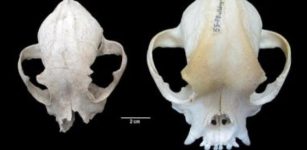 2,000-Year-Old Skull Reveals Ancient Romans May Have Been The First To Breed Flat-Faced Dogs
Archaeology | Jun 15, 2023
2,000-Year-Old Skull Reveals Ancient Romans May Have Been The First To Breed Flat-Faced Dogs
Archaeology | Jun 15, 2023 -
 Roman-era mass grave with 60 bodies found in farmer’s field
Civilizations | Aug 27, 2015
Roman-era mass grave with 60 bodies found in farmer’s field
Civilizations | Aug 27, 2015 -
 Mabon Festival And The Autumn Equinox Celebrated By Pagans
Ancient Traditions And Customs | Sep 20, 2019
Mabon Festival And The Autumn Equinox Celebrated By Pagans
Ancient Traditions And Customs | Sep 20, 2019 -
 Smuggled 1,800-Year-Old Lydian Atonement Inscription Sent Back To Turkey By Italy
Artifacts | Sep 28, 2020
Smuggled 1,800-Year-Old Lydian Atonement Inscription Sent Back To Turkey By Italy
Artifacts | Sep 28, 2020 -
 Amazing Discovery: Great Pyramid Of Giza And Its Chambers Concentrate Electromagnetic Energy
Archaeology | Jul 31, 2018
Amazing Discovery: Great Pyramid Of Giza And Its Chambers Concentrate Electromagnetic Energy
Archaeology | Jul 31, 2018 -
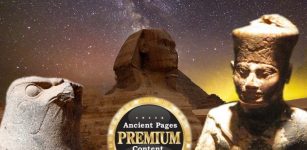 The Untold Story Of The Great Sphinx – One Of The Greatest – Part 1
Featured Stories | Aug 9, 2019
The Untold Story Of The Great Sphinx – One Of The Greatest – Part 1
Featured Stories | Aug 9, 2019 -
 Salzburg Catacombs: Early Christian Place For Secret Gatherings And Hiding From Persecution
Featured Stories | Mar 16, 2016
Salzburg Catacombs: Early Christian Place For Secret Gatherings And Hiding From Persecution
Featured Stories | Mar 16, 2016 -
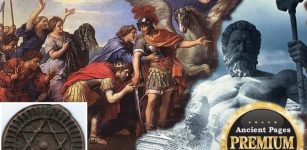 The Seal Of Solomon, The Fifth Element And The Andromeda Constellation Reveal An Intriguing Connection
Ancient Symbols | Mar 8, 2018
The Seal Of Solomon, The Fifth Element And The Andromeda Constellation Reveal An Intriguing Connection
Ancient Symbols | Mar 8, 2018 -
 Lamplighters In London: An Important Job In The Victorian Era
Ancient History Facts | May 17, 2019
Lamplighters In London: An Important Job In The Victorian Era
Ancient History Facts | May 17, 2019 -
 Ancient Ruins Of Nero’s Theater Discovered Under Garden Near Vatican
Archaeology | Jul 27, 2023
Ancient Ruins Of Nero’s Theater Discovered Under Garden Near Vatican
Archaeology | Jul 27, 2023 -
 Immigrants In Prehispanic Cancun Were Treated Just Like Maya Locals
Archaeology | Oct 26, 2023
Immigrants In Prehispanic Cancun Were Treated Just Like Maya Locals
Archaeology | Oct 26, 2023 -
 Mysterious Massive 3,800-Year-Old Structure And Passageway Found In The Jezreel Valley, Israel
Archaeology | Aug 23, 2023
Mysterious Massive 3,800-Year-Old Structure And Passageway Found In The Jezreel Valley, Israel
Archaeology | Aug 23, 2023 -
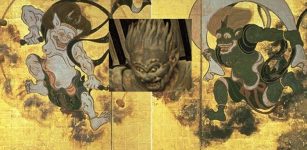 Raijin: Shinto God Of Thunder And Lightning With Three Fingers Representing Past, Present And Future
Featured Stories | Feb 10, 2020
Raijin: Shinto God Of Thunder And Lightning With Three Fingers Representing Past, Present And Future
Featured Stories | Feb 10, 2020 -
 Can This Ancient Underwater Graveyard Solve The Mystery Of The Great Flood And Noah’s Ark?
Archaeology | Oct 23, 2019
Can This Ancient Underwater Graveyard Solve The Mystery Of The Great Flood And Noah’s Ark?
Archaeology | Oct 23, 2019 -
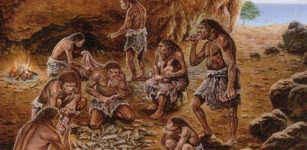 Groundbreaking Discovery Reveals High Cognitive Abilities In Humans Who Lived 170,000 Years Ago
Archaeology | Feb 7, 2022
Groundbreaking Discovery Reveals High Cognitive Abilities In Humans Who Lived 170,000 Years Ago
Archaeology | Feb 7, 2022 -
 Curse Of Evil Eye: Powerful Ancient Belief That Still Frightens People Around The World
Featured Stories | May 9, 2017
Curse Of Evil Eye: Powerful Ancient Belief That Still Frightens People Around The World
Featured Stories | May 9, 2017 -
 Sacred Helgafell Mountain And The Story Of Torolv Mostrarskjegg
Featured Stories | Mar 13, 2024
Sacred Helgafell Mountain And The Story Of Torolv Mostrarskjegg
Featured Stories | Mar 13, 2024 -
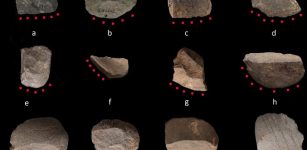 Earliest Evidence Of Rice Harvesting Provided By China’s Ancient Stone Tools
Archaeology | Dec 8, 2022
Earliest Evidence Of Rice Harvesting Provided By China’s Ancient Stone Tools
Archaeology | Dec 8, 2022

